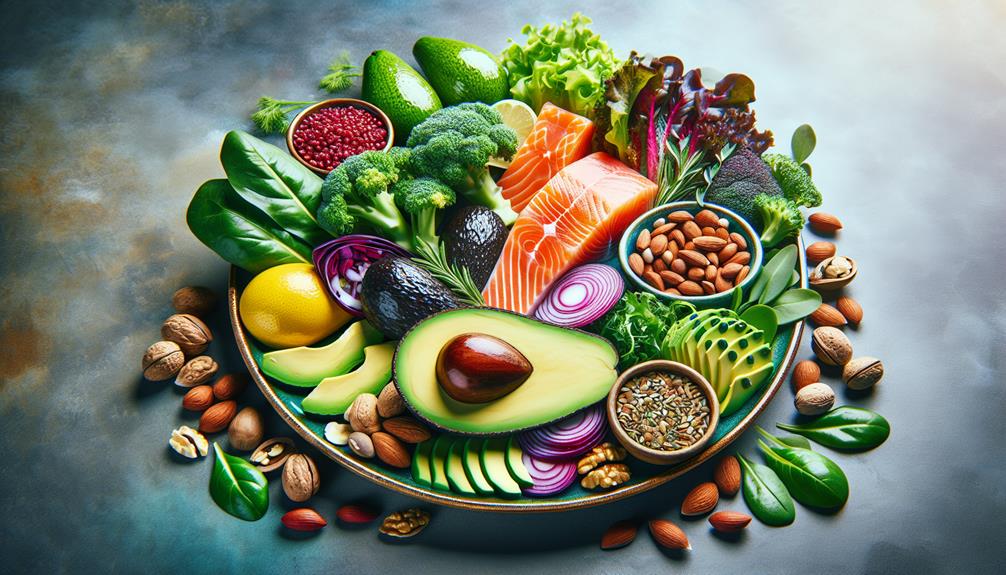Are you tired of conventional diets that promise results but leave you feeling unsatisfied? Look no further than the Keto Diet, a revolutionary approach to nutrition that has been gaining popularity in recent years. Curious to know how it works and what benefits it can offer? In this comprehensive guide, we will explore everything you need to know about the Keto Diet, from its fundamental principles to practical tips for success. Get ready to discover a new way of nourishing your body and achieving your health goals.
Key Takeaways
- The keto diet is a low-carb, high-fat eating plan that induces ketosis.
- It switches the body from using glucose to using ketones for energy.
- The keto diet promotes weight loss, improves mental clarity, and reduces inflammation.
- To succeed on the keto diet, it is important to calculate macronutrient ratios, plan meals in advance, stay hydrated, and incorporate exercise.
What Is the Keto Diet?
The Keto Diet, short for ketogenic diet, is a low-carb, high-fat eating plan that has gained popularity for its potential to aid in weight loss and improve certain health conditions. One of the key principles of the Keto Diet is the induction of a metabolic state called ketosis. Ketosis is a natural process in which your body switches from using glucose as its primary source of energy to using ketones, which are produced from the breakdown of fats. By drastically reducing your carbohydrate intake and increasing your fat consumption, you can encourage your body to enter into ketosis.
When following the Keto Diet, it is important to choose keto-friendly food options that are low in carbohydrates but high in healthy fats. Some examples of keto-friendly foods include avocados, coconut oil, nuts and seeds, fatty fish, and eggs. These foods provide essential nutrients and help keep you feeling full and satisfied while supporting ketosis.
It is worth noting that the Keto Diet may not be suitable for everyone. It is always recommended to consult with a healthcare professional before making any significant changes to your diet. Additionally, while the Keto Diet has shown promise in weight loss and certain health conditions, more research is needed to fully understand its long-term effects and potential risks.
How Does the Keto Diet Work?
To understand how the Keto Diet works, it is important to grasp the underlying mechanisms that drive the body into a state of ketosis. This is the key process that makes the Keto Diet effective for weight loss and other health benefits. The Keto Diet mechanism involves reducing carbohydrate intake and increasing fat consumption. By doing so, the body is forced to switch from using glucose as its primary fuel source to using ketones, which are produced from fat. This transition into ketosis has several effects on the body.
Firstly, the Keto Diet triggers a decrease in blood sugar levels and insulin production. With limited carbohydrate intake, the body no longer has a readily available source of glucose. As a result, it begins to break down stored fat into fatty acids, which are then converted into ketones by the liver. These ketones can be used as an alternative energy source for the brain and other tissues.
Secondly, the Keto Diet promotes fat burning and weight loss. When the body is in ketosis, it becomes more efficient at utilizing fat stores for energy. This leads to a reduction in body fat and a decrease in overall weight.
Lastly, the Keto Diet has been shown to have various health benefits. It can improve insulin sensitivity, reduce inflammation, and enhance mental clarity and focus.
Benefits of the Keto Diet

One of the key benefits of following the Keto Diet is its potential to promote weight loss and improve overall body composition. Here are four ways in which the Keto Diet can benefit you:
- Weight loss: The Keto Diet is known for its ability to help you shed excess pounds. By restricting carbohydrates and increasing fat intake, your body enters a state of ketosis, where it starts using stored fat as fuel. This can lead to significant weight loss over time.
- Improved mental clarity: Another benefit of the Keto Diet is the potential for improved mental clarity and focus. When your body is in ketosis, it produces ketones, which can provide a steady source of energy for your brain. This may result in increased mental clarity and improved cognitive function.
- Reduced inflammation: Research suggests that the Keto Diet may have anti-inflammatory effects. By reducing sugar and processed foods, which are known to cause inflammation, the Keto Diet may help reduce inflammation in the body, leading to improved overall health.
- Better appetite control: The high fat and protein content of the Keto Diet can help you feel fuller for longer, reducing cravings and promoting better appetite control. This can be especially beneficial for those looking to manage their calorie intake and make healthier food choices.
Getting Started With the Keto Diet
When embarking on the Keto Diet, it is important to have a clear understanding of how to get started and make the necessary adjustments to your eating habits. Keto diet meal planning is a crucial step to ensure that you are consuming the right balance of macronutrients and maintaining a low-carb, high-fat intake. Here are some tips to help you get started:
- Calculate your macronutrient ratios: The typical macronutrient breakdown for a ketogenic diet is around 70-75% fat, 20-25% protein, and 5-10% carbohydrates. Use an online calculator to determine the specific ratios based on your individual needs.
- Stock up on keto-friendly foods: Fill your pantry with healthy fats like avocados, nuts, and olive oil. Include protein sources such as fatty fish, poultry, and eggs. Choose low-carb vegetables like leafy greens, cauliflower, and zucchini.
- Plan your meals in advance: Create a weekly meal plan that includes a variety of keto-friendly recipes. This will help you stay on track and avoid impulsive food choices.
- Avoid common mistakes: Some common mistakes on the keto diet include not drinking enough water, not consuming enough electrolytes, and not monitoring your ketone levels. Stay hydrated, replenish electrolytes, and consider using ketone testing strips to track your progress.
Tips for Success on the Keto Diet

For a successful experience on the Keto Diet, incorporating these key strategies can greatly enhance your results:
- Keto Diet Meal Planning: Planning your meals in advance is essential for staying on track with the keto diet. Plan your meals and snacks around high-fat, low-carb foods such as avocados, nuts, and fatty cuts of meat. This will help you maintain a state of ketosis and keep your body burning fat for fuel.
- Monitor Your Macronutrient Intake: To effectively follow the keto diet, it is important to closely monitor your macronutrient intake. Aim to consume approximately 70-75% of your daily calories from fat, 20-25% from protein, and 5-10% from carbohydrates. This will help you achieve and maintain ketosis.
- Stay Hydrated: Drinking plenty of water is crucial on the keto diet. It helps flush out toxins, supports digestion, and aids in overall health and well-being. Aim to drink at least 8 cups of water per day, and increase your intake if you are physically active.
- Incorporate Exercise: While the keto diet can lead to weight loss without exercise, incorporating physical activity can further enhance your results. Engage in a combination of cardio and strength training exercises to maximize fat burning and promote overall fitness.
Frequently Asked Questions
Can I Still Eat Fruits and Vegetables on the Keto Diet?
Yes, you can still enjoy fruits and vegetables on the keto diet. While some higher-carb options may need to be limited, there are plenty of low-carb, keto-friendly produce options that provide essential vitamins, minerals, and fiber.
Are There Any Potential Risks or Side Effects of the Keto Diet?
Potential risks and side effects of the keto diet include health concerns such as nutritional deficiencies and metabolic changes. It's important to consider the long term effects and consult a healthcare professional before starting any new diet plan.
Can I Drink Alcohol While on the Keto Diet?
Yes, you can drink alcohol while on the keto diet, but it may have negative effects on ketosis. Alcohol is high in calories, can lower inhibitions, and may hinder fat burning. Moderation is key.
Is It Necessary to Track Macronutrient Ratios on the Keto Diet?
Tracking macronutrient ratios is crucial on the keto diet. It helps ensure you are in a state of ketosis, promotes weight loss, and optimizes your nutrient intake. However, tracking can be time-consuming and restrictive for some individuals.
How Long Does It Typically Take to Enter Ketosis on the Keto Diet?
On the keto diet, it typically takes a few days to enter ketosis. The time can vary depending on factors like your metabolism, activity level, and carb intake. It's important to stay consistent and patient.
Conclusion
In conclusion, the keto diet offers a promising approach to weight loss and overall health improvement. By restricting carbohydrates and increasing healthy fats, this diet helps the body enter a state of ketosis, where it efficiently burns fat for energy. The benefits range from weight loss and improved blood sugar control to increased mental clarity and reduced inflammation. However, it is important to consult with a healthcare professional and maintain a balanced approach to ensure long-term success on the keto diet. Remember, Rome wasn't built in a day, and neither is a healthy body.













